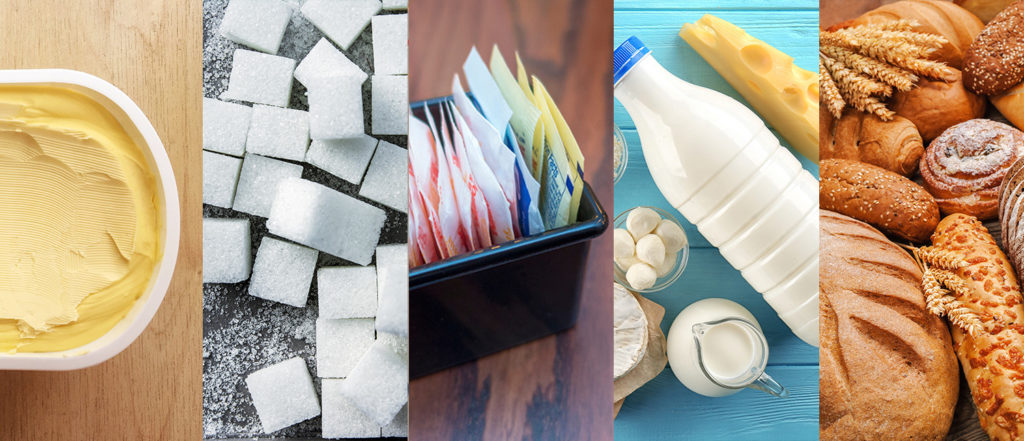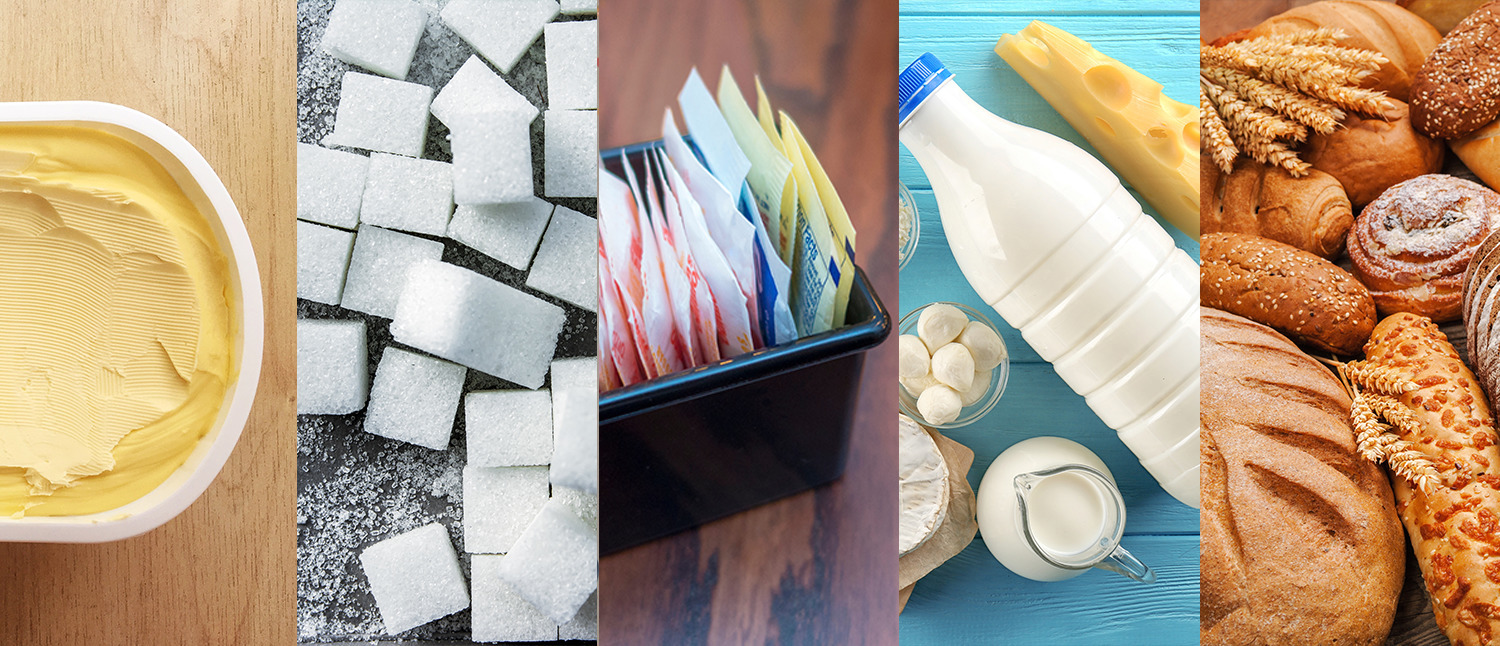There is so much confusion around healthy eating and what foods to avoid, here’s some guidance so you can make your own empowered choices for healthier habits.
I have spent over thirty years helping people, including myself, make the right food choices. It’s a lot easier than you think. You don’t need expensive gym memberships, diet pills or obsessive restrictive diets to maintain your Perfect Weight Forever. Knowing the facts and scientific evidence about the food you eat, empowers you to change your associations with food and make positive healthier choices.
You deserve to be happy in your body, with a healthy relationship to food, not being controlled by food. Your body will also thank you for the changes you can easily make to feel healthier and more energised, instead of feeling tired, lethargic, fat and unhappy. Don’t plunge deeper into self-loathing reaching for another chocolate bar, soda or a slice of pizza, thinking it will make you feel better. They will never make you feel better and I’m going to share with you why.
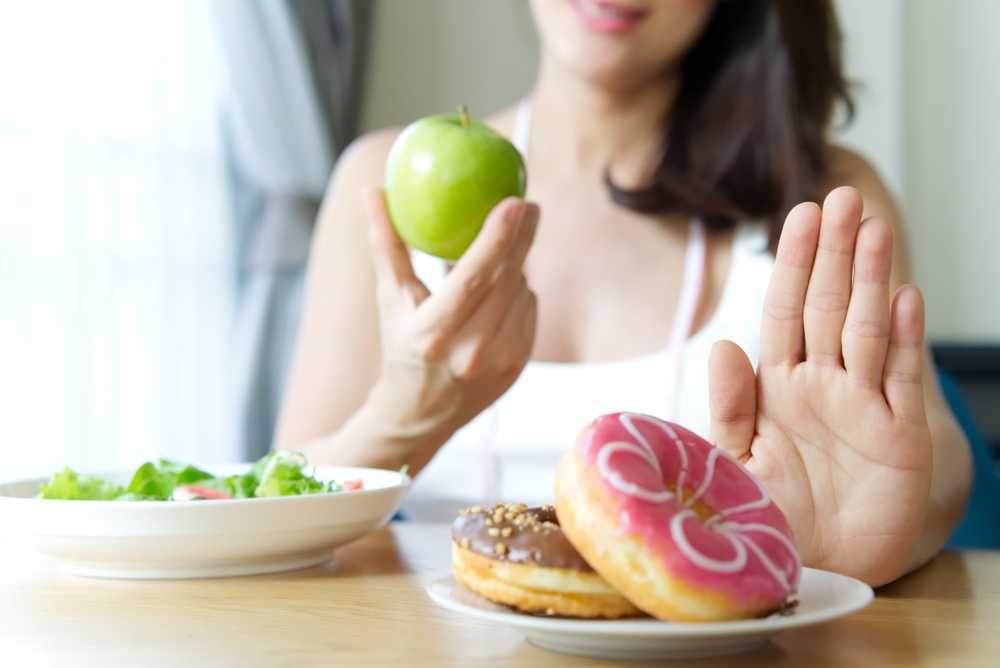
Why Should We Avoid Processed Foods?
When food is refined and processed, it is so chemically altered that our body cannot break it down properly or get nutrition from it.
Chips, cakes, chocolates, cookies, pastries, candy and ‘fast foods’ are NOT foods. So-called ‘Junk food’ and ‘fast food’ shouldn’t even be called ‘food’ – they are a cocktail of chemicals, colorings, sugar, trans fat and preservatives.
The body becomes addicted to these chemicals as they make the body release dopamine, the same way drugs do. As with all addictions, we need more and more of the drug just to get the same effect. A study at the Scripps Research Institute in Florida, USA, found lab rats became addicted to a bad diet, in the way that people become dependent on cocaine and heroin. Studies are now finding similar effects on humans with addictive foods.
According to research, a diet of burgers, chips, pizza and cake will program your brain into craving even more foods that are high in sugar, salt and fat. Over the years these junk foods can become a substitute for happiness and can lead to binges and unhealthy behaviour and addictions.
5 Foods to Avoid and Why
1. Margarine
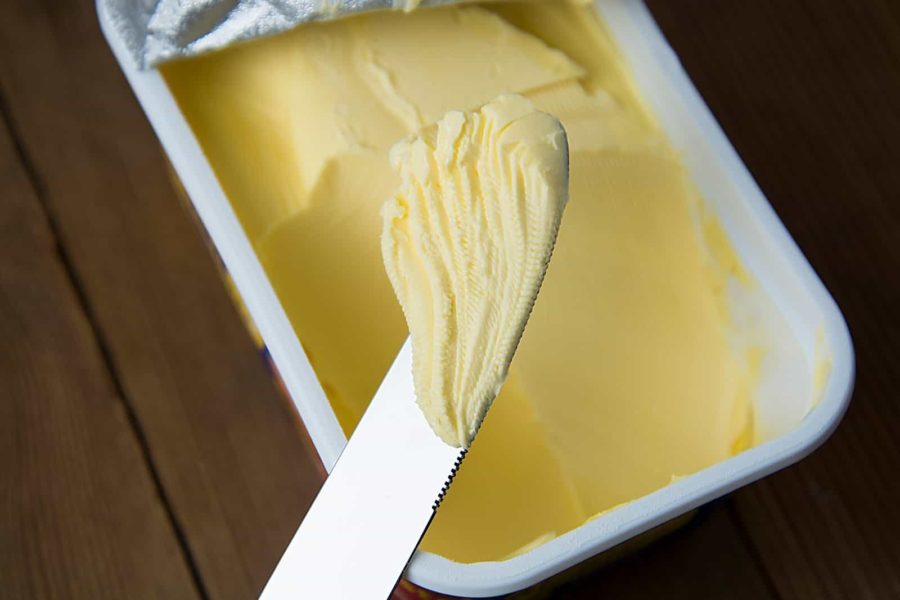
Margarine is but ONE MOLECULE away from being PLASTIC.
To prove to yourself just how bad for you margarine is, buy a tub and leave it in your garage or a shaded area outside. Within a couple of days you will notice that no flies, rodents or insects will go near it (that should tell you something!) You will notice that it doesn’t rot or smell, because it has no nutritional value; nothing will grow on it. Even microorganisms won’t grow on trans fats. It doesn’t decompose – why? Because it is nearly plastic. It’s about as real and healthy as the tub it came in and you wouldn’t melt it and eat that, would you?
It isn’t just margarine that should be in your “foods to avoid” list, many other foods contain trans fats including fast food, junk food, snack food, biscuits, pies, pastries, cakes, crackers, chips, crisps, powdered hot drinks and ready-to-eat meals should be too.
Trans fats are linked to weight gain, cancer, diabetes and heart disease. So look at that untouched plastic in your garden and remind yourself it’s a chemical, not a food, and can make you ill and fat. Remind yourself that it’s almost plastic and if it’s unfit for rats and flies it has to be unfit for you and your family. Rats know that and now you know it too.
Your body cannot break down and digest plastic (instead it wraps it in fat and stores it in your body). Eating so-called ‘slimming spreads’ and diet foods can actually make you even fatter, even if the calories are low. Try organic soy or olive oil spread instead, or even better an organic cold-pressed olive oil, stocked by most supermarkets and health food shops.
2. Sugar
 Sugar is made in a refinery and has no nutritional value at all, so the body lets you eat a lot of it looking for nutrition, which it never gets.
Sugar is made in a refinery and has no nutritional value at all, so the body lets you eat a lot of it looking for nutrition, which it never gets.
When we eat sugar our blood sugar soars; the body cannot burn off the excess and goes into fat storage. For many of us, this happens at every meal, as we consume sugar in our drinks, snacks, sauces, sliced meat, fish like smoked salmon, and countless other foods. A Mcdonald’s bun and meat patty contain so much sugar it would legally have to be classified as confectionary without the gherkin, which tilts it back into being classified as a savoury item.
Carbs are recognised and used by the body as sugar. Your body does not care if you are eating bread, baked potatoes, pasta, rice, or a bar of chocolate – it recognises all carbs as sugar. Once you have eaten more than 3 teaspoons, it stores the rest as fat.
We all know now that sugar is bad for us and that also includes excessive amounts of fruit, smoothies, juices and dried fruits, which are concentrated sugar. We have to remember that when we lived in tribes, fruit was seasonal and shared out, no tribe-person started their day with the equivalent of 10 apples or oranges, which is how much you can consume in a glass of juice.
Stop consuming sugar and stop sugar cravings once and for all.
3. Artificial Sweeteners
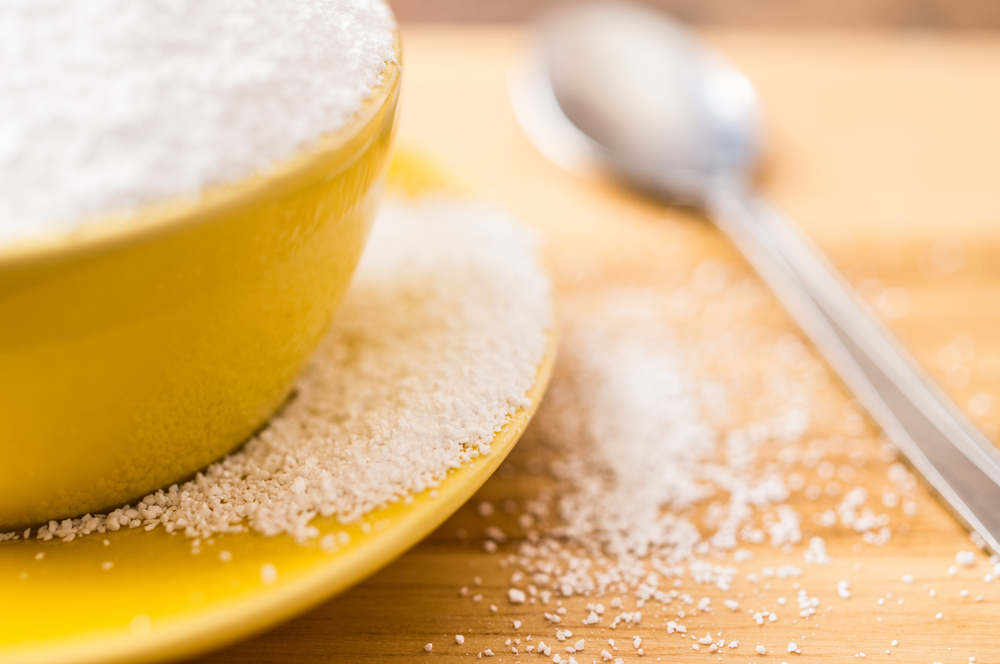 Artificial sweeteners may seem healthier but they’re also in the “foods to avoid” list. They are made of petro-chemicals and have been linked to all kinds of illnesses including cancer, Alzheimer’s, and dementia. They are actually banned in some countries and states, because of their link to mental decline.
Artificial sweeteners may seem healthier but they’re also in the “foods to avoid” list. They are made of petro-chemicals and have been linked to all kinds of illnesses including cancer, Alzheimer’s, and dementia. They are actually banned in some countries and states, because of their link to mental decline.
Sweeteners are another Frankenstein food that poisons our bodies. Artificial sweeteners are made from wood alcohol and petro-chemicals, which the body cannot break down. However, they can still raise insulin levels, even though they have no calories.
Aspartame is a particularly potent artificial sweetener used in diet drinks and ‘low-fat’ snack foods as a sugar substitute, to keep the calorie content of the product down. Reducing the fat reduces the calories, but also makes the flavour bland, so sweeteners or sugar substitutes are added to increase the flavour. However, when aspartame is combined with carbs it slows down the brain’s production of serotonin. Serotonin is a very important and essential hormone that elevates mood, which is why it’s known as the happy hormone. Research has found that bulimics, compulsive eaters and alcoholics lack the required levels of serotonin and low levels of serotonin are also linked to depression.
Natural sweeteners are healthier, like Stevia, which is made from a leaf, and Xylitol which is made from the bark of a tree.
4. Dairy
 After the Second World War (when the population needed building up), the Milk Marketing Board heavily promoted milk as a health food and the promotion worked. However, milk is actually very unhealthy and should be one of the foods to avoid.
After the Second World War (when the population needed building up), the Milk Marketing Board heavily promoted milk as a health food and the promotion worked. However, milk is actually very unhealthy and should be one of the foods to avoid.
Non-organic milk is polluted with hormones, pesticides, steroids, antibiotics and is full of synthetic hormones. In modern intensive factory-farming, cows are kept in milk all year round, injected with bovine growth hormones. Milk can contain thirty-five different hormones and eleven different growth factors.
In factory farming, the cows are milked by machine, which extract cow’s pus and blood along with the milk. All milk can be 50% mucus and has to be pasteurised to kill the bacteria, but the pasteurisation process also kills any beneficial enzymes.
Cow’s milk is not a food for humans at all, it is designed to nourish calves through their biggest growth spurt and to give them a 300% weight gain within a year. Milk contains insulin growth factor (IGF) a growth hormone, plus oestrogen and progesterone, so consuming any dairy product will have an effect on your body’s natural hormone levels.
As I noted in my book You Can Be Thin, from the Journal of the National Cancer Institute (JNCI), dairy scientists admitted that the level of a very powerful hormone contained in milk, insulin-like growth factor-I (IGF-I), increases in the human body after milk consumption. IGF-I has been identified as the key factor in the growth and proliferation of various cancers, including prostate cancer and breast cancer. Many experts believe that the IGF-I in milk and lactose may over-stimulate hormones, which may encourage tumour growth. The higher our levels of IGF, the higher our risk of developing certain cancers. Researchers at Stanford University and the National Institutes of Health found that high concentrations of the IGF-1 hormone stimulate cancer cell growth.
5. Wheat and Gluten – “Glue”
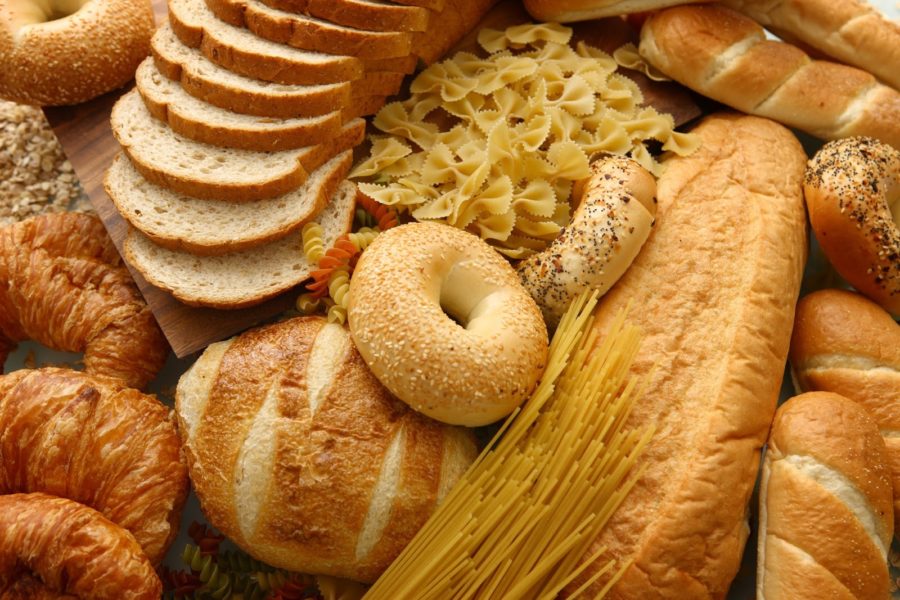 Wheat and other cereals in their most basic form are cattle feed – they exist on this planet to feed cattle. It took humans thousands of years to take the grasses that cattle and wild animals grazed on and make them available for human consumption by grinding, milling then baking them.
Wheat and other cereals in their most basic form are cattle feed – they exist on this planet to feed cattle. It took humans thousands of years to take the grasses that cattle and wild animals grazed on and make them available for human consumption by grinding, milling then baking them.
Cows have four stomachs to break down wheat as it requires a different digestive tract from a human’s much shorter digestive tract and small stomach. We don’t have four stomachs to digest wheat, but if you eat a wheat-based diet you might begin to look as if you do!
The gluten in wheat and other cereals has been linked to the rise in overweight Westerners, as it’s hard to digest and can cause allergies, fatigue, bloating, weight gain and Coeliac disease.
The word glutinous means sticky and is an adjective derived from gluten. Gluten is like glue and digestive issues arise when we eat glue for breakfast, glue for lunch and more glue for dinner and snacks.

When your wheat-based food is broken down in your body, it coats your intestines with a sticky residue, like glue. If you then eat some fresh fruit or vegetables, they will stick to this glue-like matter and ferment instead of being digested. As a consequence, your body is crying out for nutrients not calories. You are full of food but still hungry because your body cannot get enough nutrition from the indigestible food you have put in it.
Cereals are cheap. We have been misled by marketing men into thinking it’s a health food. In truth, the low-fat, high-carbohydrate diet makes people fat because the refining process removes the fiber and all the good nutrients from rice, wheat and other cereals. What we are left with is empty calories that promote overeating instead of fullness. Definitely one of the foods to avoid!
Wheat, a type of grain, is comparatively new to our diets; we started cultivating grains about 10,000 years ago, which is new considering man existed without them for well over two million years. Genetically we are almost the same as we were prior to the introduction of grains, and the foods we are best adapted to are the foods mother nature provided for us.
The 4 R’s To Help You Eat Healthy
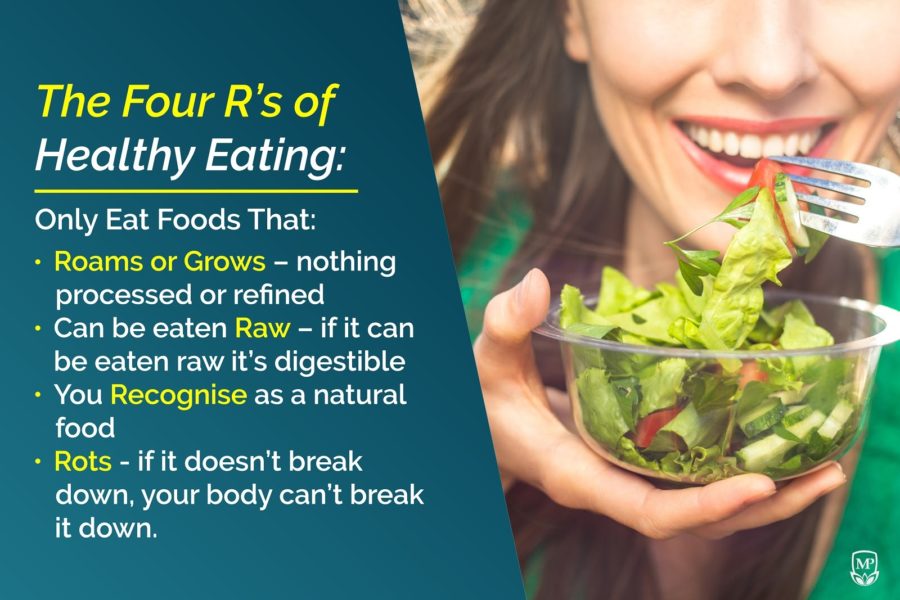 My 4 R’s will help you stick to the “foods to avoid” list and eat food that your body can digest and burn off. Our bodies are designed to eat everything that was on the planet when we evolved. Food in its most natural state is digestible.
My 4 R’s will help you stick to the “foods to avoid” list and eat food that your body can digest and burn off. Our bodies are designed to eat everything that was on the planet when we evolved. Food in its most natural state is digestible.
Roams or Grows
Food that grows and roams and does not look too different once it has been prepared and placed on your plate is digestible and in harmony with your body. If you can still recognise it as food you can eat it.
Raw
Growing and roaming food does not include flour or cereals. Our ancestors only ate food that could be eaten raw or cooked speared over an open fire, so cereals were naturally excluded. Cereals and potatoes are actually toxic in their raw state and dangerous to eat uncooked with the exception of oats, which can be eaten unprocessed and uncooked.
Recognise
Recognisable food means that you can recognise what the item is made from, like eggs, pears, peas, chicken and raw nuts. When you get to bagels, pretzels, cakes, biscuits and packets of Twiglets, cheesy curls, chocolate and jelly beans you can’t tell just from looking at them what the raw ingredients are. Recognisable food does not look very different from its natural state. Lastly, if it doesn’t rot then it’s not going to break down and be digestible in your body. It belongs in the bin, not in your body.
How good would it be to feel happier, healthier and more energised to do what you want?
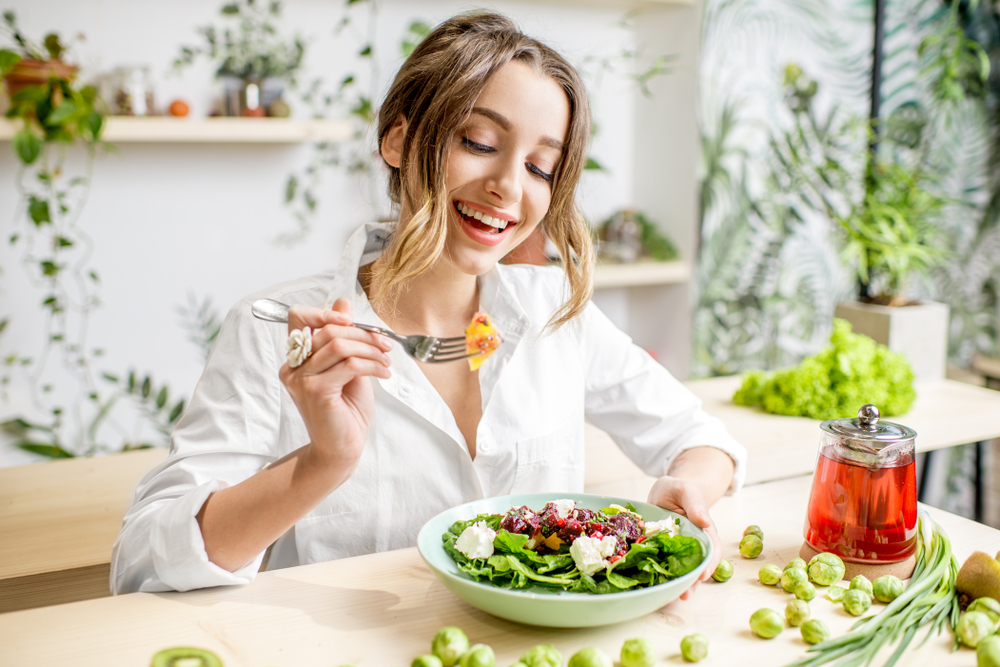
Change Your Association With Food
The most effective way to avoid unhealthy foods and enjoy healthy eating is to change your associations with food. Before eating that junk food snack, consider the pain of feeling sick, tired, overweight, lethargic and out of control to addictive foods. Instead, choose to feel great about your healthier choices and healthier habits, focus on how good it will feel to love your body and have the energy to do all the things you love.
If you stop eating sugary refined and processed carbohydrates and junk food, you will eventually stop craving them. It’s the same with all addictions: stop feeding the monster and it will die.
Just like any other addiction, you have to give up the source of the addiction, to see it as a poison for your body and keep away from it. Many people self medicate with food without even realising it. They use food to sedate themselves, to tranquillise themselves, to feel better and to elevate their mood.
So many people are addicted to sugar, salt and fat without even realising it. When YOU are in control, rather than being controlled by food, you make the choices and enjoy the benefits.
If you think you might want expert guidance as you start your journey towards making healthier choices for your body, why not consider joining Marisa Peer’s 21-Day Healthy Living Challenge? Taking place over three weeks, you will join a community of people looking to change their lives for their better, and receive daily training, regular audios, and even some meditations. These are all designed by Marisa to help you overcome your negative eating habits, and change the way you think about food, and your health in general.
To improve your relationship between your mind, your body, and the food you choose to nourish them with, click the banner below to find out more about the challenge and secure your spot today.


